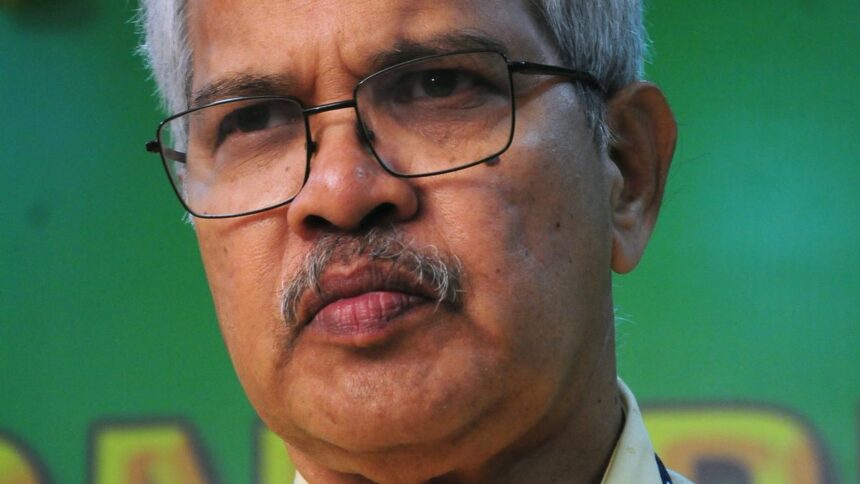Tamgo Agro Machines Private Limited, a start-up industry, at Kuttathupatti in Dindigul district.
| Photo Credit:
G. KARTHIKEYAN
“The urge to provide employment rather than seeking employment pushed me into converting my college final year’s thesis into a practical business model,” said K. Sai Vishnu, co-founder and CEO of Sea Eden.
Mr. Vishnu, a first-generation emerging entrepreneur, said that as a microbiology graduate, he had developed a basic idea about utilising high saline seawater and sand for agricultural purposes for a thesis.
The thesis, with the investment of more time and expertise, was converted into a potential and viable business idea, he added
Despite being a novice in business and management, the confidence to create an enterprise was developed through the multiple incubation centres and the expertise they provided, he noted.
The first-generation start-ups, by disrupting the markets through innovations and creating new avenues for employment, seemed to have changed the perspective of a business.
Companies, built only on ideas and meagre fundings, have no family business to fall back on, nor do they have a pre-existing network of investors, mentors, or industry connections.
Pointing out the recent influx of first-generation business enthusiasts, K. Ganesh Moorthy, CEO of MABIF, said the role of incubation centres had become indispensable to guide such start-ups through the market reality.
If not for such guidance, many start-ups owing to the overwhelming initial responses, could end up taking the wrong route, he added.
Mr. Vishnu, who is slowly adapting to the complex world of business ownership, said that if not for the incubation centres, be it in his college, or IIT-Madras or Madurai Agribusiness Incubation Forum (MABIF), the ideas he possessed would have just remained a theoretical framework.
Though his business was at a nascent stage, the support system enabled through various institutions and funding agencies helped him develop three products – salt-tolerant biofertilizer, heat-tolerant seeds and heat-tolerant foliar spray, he added.
Even when the products were an innovation in the market, the business viability of it could be determined only through expertise, he noted.
“As an entrant to the field of business and marketing from a research background, I felt the need of a holistic approach to the whole process of developing and selling a product,” he said.
As they were in the final stage of grant approval from the RKVY-RAFTAAR funding, Mr. Vishnu said the opportunity which came through one of the incubation centres would provide ₹25 lakh as seed stage funding.
Unlike the conventional business models dependent solely on customer and the products, the emerging models demand a wholesome approach to the problems and the system, said A. Ronikka Mary, Director of Tomgo Agro Machines, Private Limited, Dindigul.
The research and manufacturing of miniscule cranes to repurpose it for agricultural works came in handy for Ms. Mary and her husband A. Thomas, but the inexperience and lack of skills in marketing and other works that ensued production put their business back by many years.
“We thought that manufacturing itself would kickstart the entire business, but we were proved wrong by the real-time problems we faced in selling and bringing in more fund,” she added.
When the business was started in 2021, they were unaware of any of the incubation centres and resource expertise provided by both the State and Union government. They did not want to approach any external resource person as they believed it would disrupt their ideas, she noted.
But, recently after suffering losses, she said they decided to seek the help of State funding agencies.
“Again, they hit a roadblock when the District Industries Centre denied their application citing their company had already recorded a yearly turnover,” she said.
They realised that such intricacies in the system could be manoeuvred only with the knowledge or assistance of an expertise, she stated.
The emerging companies, especially start-ups, when trying to build up their business by trial methods could not be sustained in the long run.
In that matter, even for an experienced and subject expertise like Ajeet Kumar, Co-founder and CEO of Gudlyf Mobility Private Limited, a former engineer in the Ministry for Heavy Industries, an incubation support was required to build his business from the scratch.
The company which manufactures non-metallic cylinders to use in rockets, vehicles and other mechanisms, could not evolve into a company until the incubation centres like Thiagarajar College of Engineering Technology Business Incubator, IIT- Madras, stepped in to give a shape to the product, he said.
Even when the product was a viable alternative to conventional metallic cylinders and the experts knew the benefits of its uses, to market the product, an outsider perspective with an expert lens was essential, he observed.
“Through the links provided by the State-sponsored start-up programmes, they were able to source various funds and start manufacturing even before our unit is ready in Madurai,” Mr. Kumar noted.
Other similar business developed through agri-incubation centres like MABIF was Millets N Minutes.
The company, which was based in Madurai, produced food items with the known millet ingredients, but the innovation of the products came in when the research process stepped into give a twist to the varieties made in the company.
Many obvious ideas even when perceived could not be transformed into tangible products unless a third person gets involved, said Subhasini Dharmendra, Managing Director of the start-up.
“Some of the products like jaggery-coated millet replicating Kurkure snacks were developed through an expert idea. To increase the shelf life of the snack, we learned that the jaggery coat could be used as a preservative,” she noted.
Not just the marketing, but the whole mechanism of a business setup until learned thoroughly, could derail the business drastically, said Mr. Ganesh Moorthy.
Notwithstanding the success of the business and the profit of the company, he stressed that they had witnessed several companies experiencing heavy loss due to unprofessional business practices.
“The more support the government provides for start-ups, it also imposes heavy fines for mismanagement and improper revenue maintenance,” he added.
In such cases, the start-ups without support of incubation centres could lack technical knowledge and end up disrupting the system.
In addition, the funding system adopted by incubation centres like MABIF encourages many first-timers to step in the new world of business and entrepreneurship, Mr. Ganesh Moorthy stated.
“When a business enthusiast steps into the world of start-ups, chances of getting overwhelmed and taking missteps are very high,” he added.
The rising awareness of the government initiatives in relation to business start-ups should be taken seriously by newcomers, he stated.
“The guidance and expertise of experienced personnel could not be fulfilled by any business school or a degree,” he said.


















